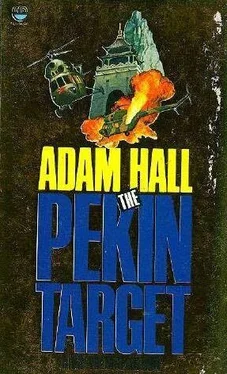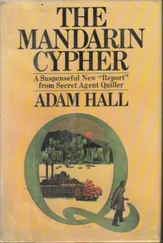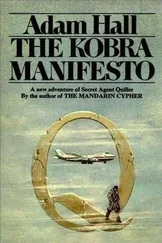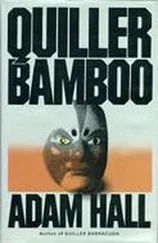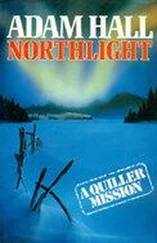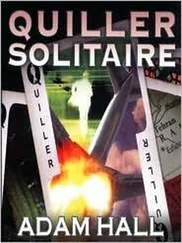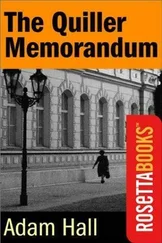On the level below I told Ferris to shove the bloody thing in a slot for a minute and then I just sat there in my own sweat and for the first time wondered how far gone I was, sitting here still crouched in the instinctive low-profile target position while the signals flashed through my mind from Ferris to Croder, they've tried five times now and I don't think he can stand the pace… Croder to Ferris: there's no point in leaving him out there if he's losing his nerve… sitting hunched up with my eyes screwed shut, wondering how to face the man beside me when I opened them, because there had been no chance, no chance at all, that anyone of the Triad knew where we were.
After a long time I heard Ferris saying quietly, "Why don't you go home, Q? Anyone else would."
I opened my eyes and straightened up in the seat and took a breath and held it and took another one, wanting to get some steadiness in my voice.
"This is home."
"Where the brink is?"
"That's right."
After a while he said, "The most I can probably get for you is another twenty-four hours out here."
"Then get me that."
Decapitation produces almost total blood loss from the facial area within a few seconds, but the embalmers had injected their resins skilfully and the face of Soong Yongshen was recognisable as the face of the young man in the photograph above the open coffin as I stood looking down at him. The white death-robe had been drawn all the way to the chin, so that nothing remained visible of the manner of his passing.
The room was still and airless, and sickly with the smells of formaldehyde and the incense burning in the sconces; the shutters had been closed against the noonday sun, and in the light of the many candles the massed bouquets of flowers bloomed with unearthly colour.
Soong Li-fei had not been here when I arrived a few minutes ago, but she came in now, wearing a white chongsam and with her eyes red from crying; the instant she saw me she stopped dead and glanced quickly at the faces of the three men who were waiting for her patiently with their flowers and paired silk scrolls; she greeted them hastily, listening to their half-whispered condolences and then making a sign for me to follow her through the screened doorway.
"Why did you come here?" she asked quickly in French.
"To talk to you."
"They're looking for you, and there's nothing to say."
"Who are 'they'?"
We were in a narrow hallway, darkened by the closed shutters, and her cinnamon eyes were in shadow: I had to learn what I could from her voice alone.
"You must leave. You're in great danger here."
I could feel her aura of tension as we stood close together; I meant nothing to her, except that perhaps she was grateful for my not having brought in the police and accused her of attempted murder the night I'd arrived in Seoul; also she was sick enough of death, and didn't want to see murder done in a house of mourning.
"Who is it that's looking for me?" I asked her.
She said impatiently, "Any of them might come here at any moment, to offer condolences. Please go — I'll show you the back way."
I held her arm lightly; it was the arm of a china doll, ice cold under the silk sleeve though the hallway was stifling. "What did the man say, outside the house here, two nights ago? What did you say to him?"
She sounded confused. "What man?"
"You were walking home from my hotel, the night of the wind, and a man spoke to you outside the door." I was watching her eyes, but there was too much shadow for me to read them.
In a moment she said hesitantly, "He asked me if I had killed you, at the hotel."
"And what did you tell him?"
"I said you were the wrong man, and that they'd been mistaken."
She was trying to pull away, to lead me along the hall to the back of the house; I didn't let her. "What else did you say to each other, Li-fei? The quicker you tell me these things, the sooner I'll leave."
She moved again. "I've nothing to tell you. It's all finished with."
I let her go, because I knew how to stop her. "I know who killed your brother."
She caught her breath, and I waited; but she said nothing. I could hear quiet footsteps now in the room through the screened doorway as someone came in from the street; or perhaps it was one of the three mourners going out: it was impossible to tell from their sound. I watched the doorway, and the play of shadows on the ceiling, cast by the candlelight.
It had been dangerous to come here, I'd known that; but Ferris had told me he'd try to get me another twenty-four hours and I'd have to hurry. I'd phoned the airport as soon as I'd left him, and they'd told me that Li-fei was at her house: her brother's body had been flown in late last night. I'd had to come here; there was no choice.
"It was Tung Kuo-feng," I told her, "who ordered your brother's execution. Your brother made a serious mistake."
A vertical band of candlelight was falling across the hall from the doorway, and she had moved into it when she'd drawn away from me; it lay half across her body, so that one of her eyes was lit by it, watching me without blinking.
"How do you know these things?"
"I know them."
The shadows on the ceiling were changing, as a man's head moved past the candles in the room of the dead; I listened to their feet shuffling, but still couldn't tell whether anyone else had come in. If one of the Triad were here, he might come through the doorway: Soong Yongshen had been an important figure among them, and entrusted to carry out the assassination in Pekin; the fact that he had made an unpardonable mistake, and had died for it, didn't mean the Triad wouldn't officially mourn him, for fear of his outraged spirit.
Li-fei turned her delicate head a degree, so that she could watch the narrow gap between the screen and the doorway; I could only watch the shadows.
"Yes," she whispered, "it was Tung Kuo-feng who ordered my brother's death." She watched the doorway. "Tung Kuo-feng," she whispered again, as if her tongue could be a dagger.
"Tell me where to find him."
She swung her head. "You want to find him?"
"Yes."
"What would you do?"
"Kill him."
Her one eye, lit by the candlelight, widened. "Why?"
"I've got my reasons."
"Who are you?"
"His enemy."
She watched me. I waited.
"I must know who you are."
"What difference does it make who I am?"
With sudden impatience she said, "Because of trust. There are those who trust me."
I would have to go the long way round, and go carefully.
"Did you know your brother was going to Pekin to carry out an assassination?"
She closed her eyes and in a moment said with a soft fierceness: "No. I would have stopped him." Her slender body had begun swaying slightly in the band of light, and she spoke in a kind of rhythm. "He said he was going to Pekin to do something very important. He said he'd been chosen as the one to do it; he said it was an honour for him; he said it with pride." I watched tears glistening at her eyelids now, and her voice had anger in it. "I knew he was with one of the Triads; but he was young; many young men like my brother go into the Triads, for the adventure of it; many are taken to prison when they're caught; the lucky ones lose their taste for crime, and come away, and find jobs. My brother didn't come away in time."
"Do you think Tung Kuo-feng should have killed him?"
"What for? Why should he want him killed?"
"He made a grave mistake. Your brother killed a man, too: the British Secretary of State, a diplomat trying to make peace in the world, a man with a wife and two daughters."
She half turned away from me, closing her eyes for a moment. "Yes," she whispered. "My brother killed a man for Tung Kuo-feng. There is no excuse for that. But he was my brother, and Tung Kuo-feng took his life away. I cannot forgive that."
Читать дальше
